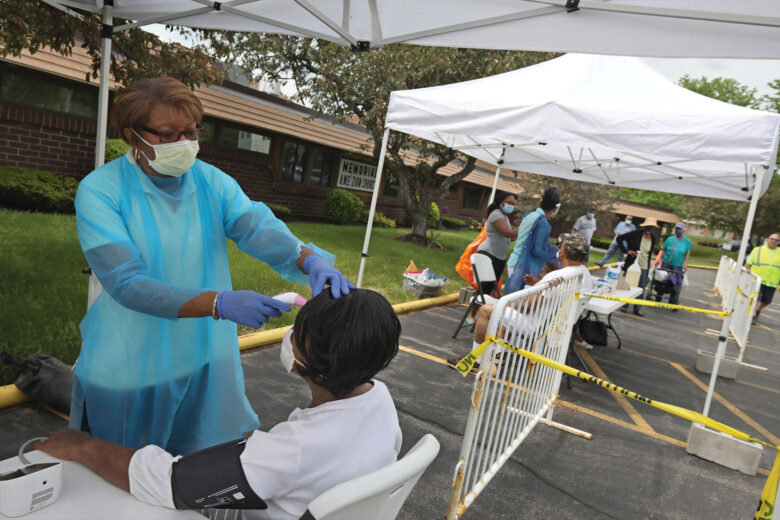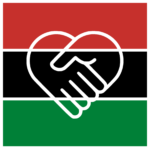Source | Rochester Democrat and Chronicle
In early Spring, the Black Physicians Network of Greater Rochester, the Rochester Black Nurses Association and public health organizations mobilized to form “Community Fighting COVID.” The organization was formed to specifically help communities of color prepare for the brewing pandemic by providing culturally competent information.
Now, almost a year after the first known COVID-19 cases, the disproportionate impact of the pandemic on communities of color in Monroe County and elsewhere is starkly shown in the numbers.
When adjusted for age, the COVID case rate at the end of October showed that Black Rochesterians had contracted the coronavirus at three times the rate of the white population; according to surveillance data from the Emerging Infections Program at the Center for Community Health and Prevention at the University of Rochester Medical Center.
But Black communities are not disproportionately impacted by COVID-19 because of recklessness or a refusal to follow COVID-19 guidelines, but because they are more likely to work in fields that are more susceptible to getting the virus, said Dr. Linda L Clark, board president of the Black Physicians Network of Greater Rochester.
“We are more likely to be frontline workers; we are more likely to take mass transportation; we are less likely to be able to stay home and work (or stay home and be sick!),” Dr. Clark said in an email.
According to the Center for Economic and Policy Research (CEPR), “nearly three out of every ten (29.7 percent) Black workers work in one of six frontline industry groups, compared to just under one out of every five (19.2 percent) white workers.” Those are jobs in grocery stores, public transit, health provision and child care and social services.
This means that even when the city, state or nation are enforcing a mandatory lockdown, Black workers are still more likely to be the workers who cannot work from home.
“The conditions that led the disease’s disproportionate spread to Latinos and African Americans in the spring persist today,” the African American Health Coalition and the Latino Health Coalition said in a Nov. 12 statement released by Common Ground Health.
“Although physical distancing has been recommended to prevent transmission, African Americans and Latinos are still less likely to work remotely and more likely to use public transportation and to live in multifamily households. These and other social determinants make these communities more vulnerable to severe disease and death from COVID.”
That higher vulnerability is driving the combined efforts of a broad-based coalition of the region’s health organizations.
Community web of partnerships
The RBNA, Black Physicians Network, Common Ground Health, Trillium Health and other organizations have worked collaboratively over the past nine months to offer a COVID-19 pre-screening that consisted of COVID-19 symptom questions, blood pressure readings, oxygen saturation and temperature assessments. Clinical and non-clinical volunteers came together at Jordan Health and Father Tracy Advocacy center in the spring to help with the pre-screening efforts.
The city, county and other groups like the Latino Health Coalition and the African American Health Coalition have also partnered with providers of nonclinical services, like churches, barbershops and beauty salons, to promote the community health.
In tandem with Roc City Sicklers Advocate Support Group and the University of Rochester, RBNA found that food and medication assistance were the major concerns people faced during the COVID pandemic said Dr. Yvette Conyers, president of the Rochester Black Nurses Association. RBNA purchased gift cards to local grocery stores. Nurses from the organization met with families to answer questions about the ways in which COVID-19 can affect sickle cell disease.
In May, RBNA received another grant, this one from the National Black Nurses Association and Black Hollywood Education and Resource Center, to assist communities affected by COVID-19.
“Our target population included shelters working with homeless individuals and seniors dwelling in ZIP codes with higher COVID-19 rates,” Conyers said.
Dr. Clark said that education about COVID-19 is individualized. Community Fighting COVID held many sessions in the community, under tents provided by the city, in an effort to reach people where they are. Some were in empty parking lots in sites like Bulls Head Plaza or on church grounds. At the sessions, held in conjunction with health facilities like Jordan Health at Woodward and Brown Square, Community Fighting COVID provided assessments.
“Sometimes more of the education was around management of blood pressure — we handled whatever was most important and pressing,” Dr. Clark said. “However, we always gave a (COVID-19) prevention message with each encounter, using colorful graphics and everyday language to help keep people in our community safe during this pandemic. We had the materials, developed by Common Ground Health, in English and Spanish, which (pictured people) who were reflective of our community.”
Medical mistrust a major barrier
Dr. Clark cites medical mistrust as a major challenge which doctors and healthcare professionals must recognize when working with populations of color, specifically Black populations.
Confidence in the federal guidance offered by the Centers for Disease Control and Prevention has faltered during the 2020 novel coronavirus pandemic, according to research by the Pew Charitable Trusts. But for Black communities the history of distrust goes back at least 90 years.
Dr. Clark cites the Tuskegee Syphilis Experiment begun in 1932, when the CDC and PHS knowingly infected hundreds of Black men in Tuskegee, Alabama with syphilis, and the exploitation of Henrietta Lacks in the early 50s; a cancer patient whose cells were stolen without her consent and used for medical research.
Police brutality, too, may affect communities of color’s trust in the medical system. In Rochester, after the death of Daniel Prude, Free the People Roc protesters said that both police and Strong Hospital bore responsibility for his death. In June, La Cumbre, a Latino coalition, and the Greater Rochester Black Agenda Group, an organization of Black leaders, held a press conference in which they said that racism constitutes a public health crisis.
The practice of racially-biased medicine, Dr. Clark said, still impacts the medical field today. She also said that medical education is limited in how students are taught to recognize diseases in people with different complexions who may present differently.
Because of this mistrust, it is very important that community members who understand cultural nuances help disseminate information, Dr. Clark said.
“The underlying messages are not changing – we have to continue to exhibit the love and concern we have for one another other by: wearing masks outside of our homes; staying home when sick (which, I recognize, can cause economic ills for some); washing our hands frequently; and practicing physical distancing (even with our masks on!),” she said. “We need to think creatively how to re-work those same messages in the context of the communities we serve.”
Medical mistrust will inevitably lead some community members to attempt to refuse a vaccine now that there is the real prospect of availability.
“As we know, the COVID-19 vaccine will soon be out,” Conyers said in an email,”… and it is imperative that the messaging is consistent and comes from us, the Black leaders in the greater Rochester community.”
Thanksgiving is a looming threat. Government and health officials alike are warning against large family gatherings that might lead to another spike in COVID-19 cases. Still, after a tense, arduous year, families might still be planning on gathering. The Latino and African American Health Coalitions strongly encourage families to keep from doing so.
“As community members, we need to do our part to ensure that our actions today do not harm our collective health and jeopardize our ability to spend many future holidays together,” they said.
Adria R. Walker covers public education for the Democrat and Chronicle in partnership with Report for America. Follow her on Twitter at @adriawalkr or send her an email at arwalker@gannett.com. This reporting is made possible by readers like you.
Last modified: November 17, 2020




